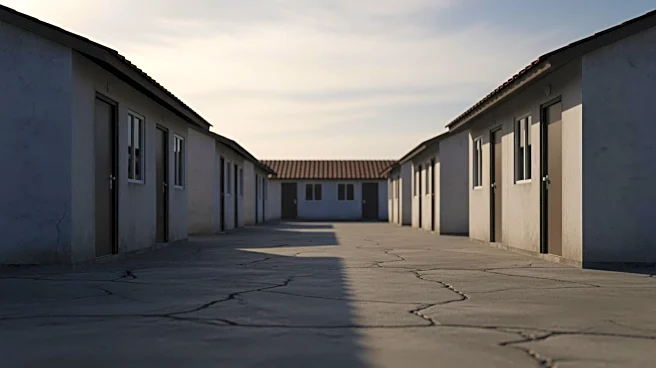What's Happening?
The Trump administration is implementing significant changes to its homelessness policy, focusing on reducing funding for long-term housing solutions. The Department of Housing and Urban Development (HUD) announced that funds will be redirected towards
transitional housing that requires work and addiction treatment. This policy shift aims to address the root causes of homelessness, such as illicit drug use and mental illness, while promoting self-sufficiency. Despite an overall increase in homelessness funding from $3.6 billion to $3.9 billion, critics warn that approximately 170,000 individuals could be at risk of losing their housing. The timing of the funding changes has also raised concerns, as programs may face a gap in funding due to delayed notices. HUD will no longer automatically renew existing programs, potentially displacing individuals who have found stability in permanent housing.
Why It's Important?
The policy shift by the Trump administration could have significant implications for homelessness in the United States. Critics argue that the changes may exacerbate the issue by removing support for those who have benefited from permanent housing programs, particularly seniors and disabled individuals. The move away from the Housing First approach, which has been supported by both parties for decades, reflects a conservative backlash against longstanding policies. This approach has been credited with reducing street homelessness by prioritizing permanent housing before treatment. The new focus on transitional housing and enforced sobriety may leave out individuals who do not fit these criteria, potentially increasing homelessness rates. The decision also highlights ongoing debates about the best strategies to address homelessness, with concerns about rising rent costs and addiction rates.
What's Next?
The Trump administration's policy changes are likely to prompt reactions from various stakeholders, including homelessness advocates, local governments, and service providers. As programs adjust to the new funding priorities, there may be increased pressure on transitional housing facilities and faith-based groups to accommodate those affected by the cuts. The shift could also lead to more enforcement of bans on homeless encampments, aligning with President Trump's previous calls for cities to clear such areas. The broader impact on homelessness rates and the effectiveness of the new approach will be closely monitored, with potential adjustments based on outcomes and feedback from affected communities.
Beyond the Headlines
The ethical implications of the Trump administration's policy shift are significant, as it challenges the principles of trauma-informed care and the rights of individuals experiencing homelessness. The decision to prioritize transitional housing over permanent solutions raises questions about the balance between self-sufficiency and support for vulnerable populations. Additionally, the increased role of faith-based organizations in providing services may lead to discussions about the separation of church and state in public policy. Long-term, the changes could influence national debates on housing affordability, addiction treatment, and mental health care, shaping future policies and public perceptions of homelessness.


















